HEARING ON MOTION TO REPLACE PENSION BOARDS AUG. 2, 2013 10 AM
Judge Rhodes takes federal jurisdiction over broad range of issues
Represents national challenge to pension rights guaranteed by states
Firefighters, other retirees mobilizing to stop the attack
City services will NOT improve, despite contentions by Orr, Freep
By Diane Bukowski
July 28, 2013
DETROIT – Detroit firefighters and other city workers shouted out “This is war” in protests this week, after U.S. Bankruptcy Judge Steven Rhodes declared exclusive federal jurisdiction over actions related to their pensions and all matters connected to Detroit’s historic bankruptcy case, both present and future. The bankruptcy filing is the largest in the history of the U.S.
Judge Rhodes’ sweeping order is significant particularly because it takes the issues out of Michigan’s state courts. The Michigan Constitution has strong provisions protecting public retiree pensions, whereas there are no such protections under federal statutes.
“It was argued today that perhaps the exclusive grant of jurisdiction to the Bankruptcy Court in Chapter 9 is unconstitutional,” Rhodes said during his ruling. “I find nothing in the 10th amendment or the more ambiguous concept of federalism to support that. In all of the other recent Chapter 9 cases, the Bankruptcy Court determined eligibility. This is entirely consistent with the bankruptcy and supremacy clauses of the Constitution. There is nothing in Title 28 jurisdictional provisions that suggests that Congress intended for state courts to have jurisdiction.”
The 1oth Amendment to the U.S. Constitution says, “The powers not delegated to the United States by the Constitution, nor prohibited by it to the states, are reserved to the states respectively, or to the people.”
His ruling as finalized reads in part, “Pursuant to section 105(a) of the Bankruptcy Code, the Chapter 9 Stay hereby is extended to apply in all respects (to the extent not otherwise applicable) to the State Entities (defined as the Governor, the State Treasurer and the members of the Loan Board, collectively with the State Treasurer and the Governor, and together with each entity’s staff, agents and representatives), the Non-Officer Employees and the City Agents and Representatives.
“For the avoidance of doubt, each of the Prepetition Lawsuits hereby is stayed, pursuant to section 105(a) of the Bankruptcy Code, pending further order of this Court.
“This order is entered without prejudice to the right of anycreditor to file a motion for relief from the stay imposed by this order using the procedures of and under the standards of 11 U.S.C. § 362(d)-(g).”
Judge Rhodes’ full court ruling is at DB Rhodes order 7 24 13.
(VOD will be publishing links to other court documents later.)
JUDGE RHODES GRANTS JONES DAY MOTIONS

Heather Lennox leads Jones Day’s victorious charge out of court July 24.. Beside her is Jones Day Attorney David Heiman and in background at right is managing partner Stephen Brogan.
Judge Rhodes’ sweeping order completely granted “stay” and “extended stay” motions by the City of Detroit, as represented by Emergency Manager Kevyn Orr and the megalith, ultraconservative Jones Day law firm. Jones Day was hired after mass opposition from Detroit residents who said it represents most of the city’s corporate creditors in other matters.
Jones Day has a team of five in town handling the bankruptcy and debt re-structuing, including its Managing Partner [i.e. CEO] Stephen Brogan. Attorney Heather Lennox argued their case July 24.
Lennox, of their Cleveland office, according to the law firm’s website, is “a restructuring partner, has counseled manufacturing clients in various industries through bankruptcies involving significant changes (both negotiated and court-imposed) to collective bargaining agreements, retiree benefits, and pensions affecting various unions.”
NATIONAL ATTACK ON PENSION RIGHTS
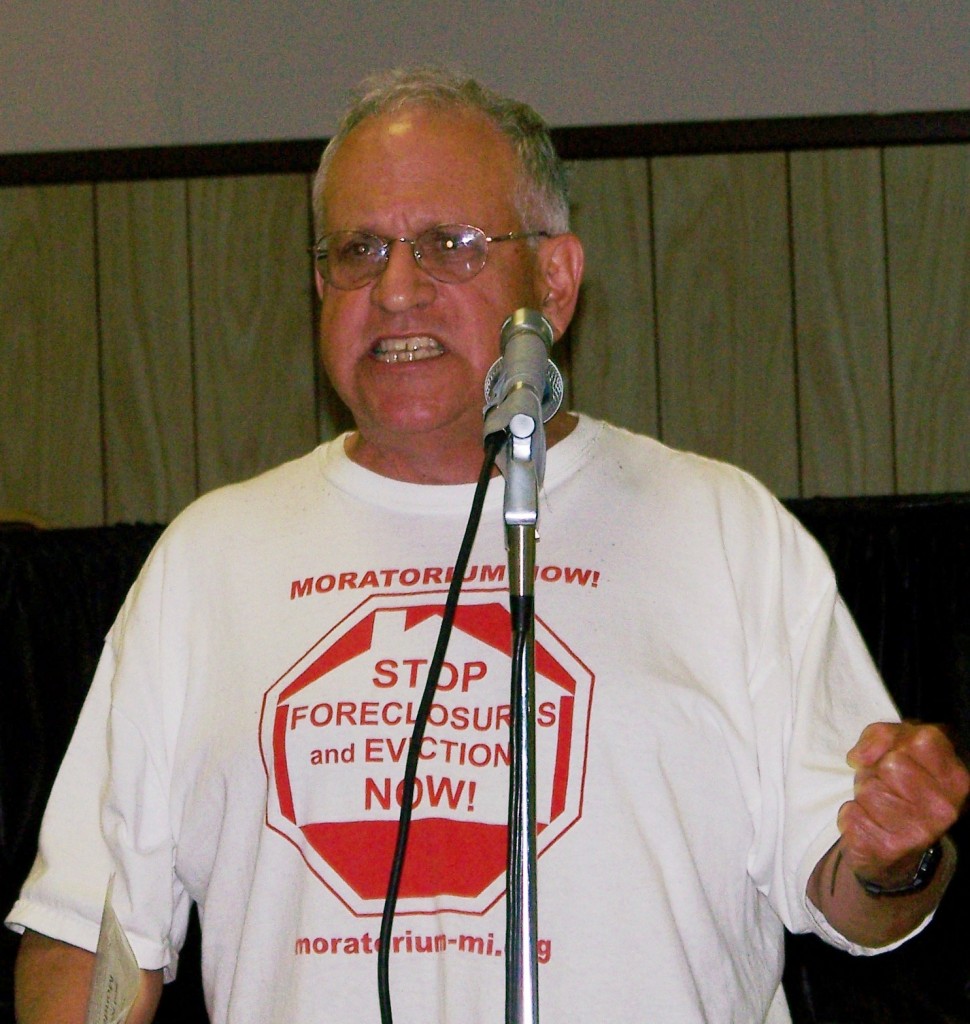
Attorney Jerome Goldberg of Moratorium Now Coalition speaks against banks at Detroit Financial Review Team meeting March 26, 2012/ Photo by Diane Bukowski
Attorney Jerome Goldberg of the Moratorium NOW! pointed out the national implications of Judge Rhodes’ order.
“Detroit is now in the forefront of what amounts to a national attack on the working class and pensions across the country orchestrated by the ruling class and banks who caused this crisis,” Attorney Jerome Goldberg of the Moratorium NOW! Coalition said, speaking outside Rhodes’ court July 24.
“Twenty-four other states have constitutional protections of public pension benefits,” Goldberg explained. “Michigan’s law is among the best. If it is eviscerated here, this will be a signal to the other states. The real secured debts are the pensions, secured by the workers who sacrificed higher pay for them. The city’s debts to the banks must be cancelled. They have committed predatory lending both to homeowners resulting in massive foreclosures that have devastated Detroit, and to the city and other municipalities, out of greed for profits.”
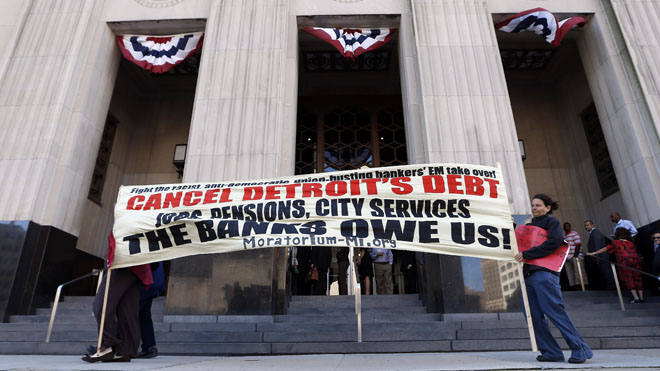
Protesters carry a sign outside the Levin Federal Courthouse in Detroit, Wednesday, July 24, 2013. .(AP Photo/Paul Sancya)
Most civilian city workers make less than $19,000 annually in pensions, said a union attorney during the hearing before Rhodes. For many, their pensions are reduced when they become eligible for Social Security. Detroit firefighters and police, however, don’t even pay into Social Security, so their pensions are their only source of income after retirement.
FIREFIGHTERS PROTEST EN MASSE; THEY GET NO SOCIAL SECURITY
Darrell Freeman, captain of Engine 59 and president of the Phoenix, the city’s Black firefighters association, spoke to VOD as dozens of firefighters, clad in red T-shirts declaring “Detroit Vs. Everybody,” joined with Moratorium NOW! outside Rhodes court. The firefighters have been protesting daily outside the Coleman A. Young Center as well.
“We don’t pay into the Social Security system,” Freeman said. “This is our primary job. Firefighting is the second most stressful job after being president. Our average life expectancy is 65. We are defending our pensions for our families. It is amazing to me that the courts are not being sympathetic to the fact that we have given our lives to the city and for the city. The whole state of Michigan voted against emergency manager laws—that should play a part in Judge Rhodes’ decision.”
Freeman declared further, “They are clearly gangsters. They want to take everything we’ve earned over the years after approving Public Act 436 in the wee hours, in a lame duck session. For people not to see this is a travesty. [Michigan Gov. Rick] Snyder’s plan all along was to combine our pension money into [the Michigan Employees Retirement Association]. Ours is outperforming pension funds there. He’s been after our money since he’s been in office.”
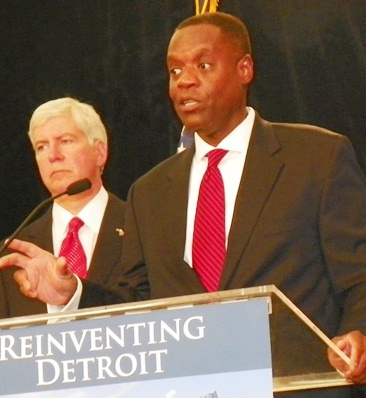
Detroit EM Kevyn Orr with boss Gov. Rick Snyder at press conference July 19, 2013./Photo Diane Bukowski
PA 436 replaced PA 4, which Michigan voters overwhelmingly repealed Nov. 6, 2012.
Orr later threatened the firefighters for claiming, as their pension fund’s actuary Gabriel, Roeder and Smith says, that the Detroit Police and Firefighters Retirement System (DPFRS) is 96 percent funded.
The city earlier hired Milliman, Inc., as its pension “consultants.” It has declared in secret reports that funding levels for both the DPRFRS and the Detroit General Retirement System (DGRS) are far lower than their actuary says.
In the bankruptcy proceedings, Orr has moved for the appointment of a “Retirees Committee” by Judge Rhodes to represent retirees, replacing the elected pension board trustees. A section of PA 436 says that if the city’s pension systems fall below an 80 percent funded level, Orr can remove any or all of the trustees and replace them.
Rhodes has set a hearing on Orr’s motion, which would essentially replace the pension boards, for Friday, Aug. 2, 2013 at 10 A.M. in Room 100 of the Federal Courthouse at 231 W. Lafayette in downtown Detroit. (Click on DB 8 2 13 order for full text of his scheduling order for July 24 and August 2.)
PROTESTERS DEMAND BANKS PAY
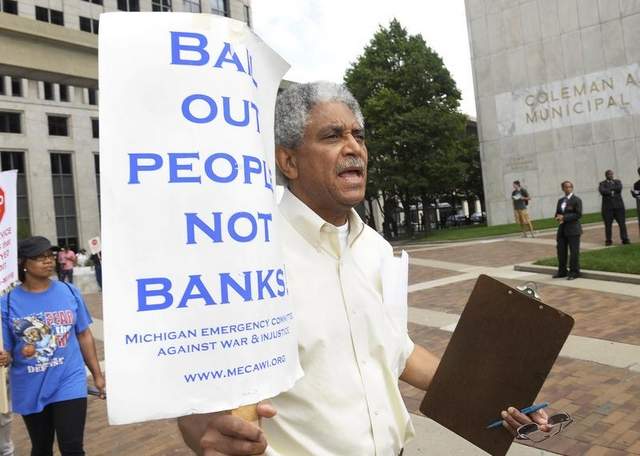
Detroit Health Department retiree Walter Knall protests outside the Coleman A. Young Center with dozens of others July 26.
Along with the firefighters, Moratorium NOW!, with the newly formed “Stop the Theft of Our Pensions Committee,” brought retirees and their supporters by the dozens to protest outside the Federal courthouse building in downtown Detroit on July 24, and outside the city’s headquarters, the Coleman A. Young Center, on July 26. They declared “THIS IS WAR!” in their fliers. They also demanded total cancellation of the city’s debt to the banks, many of which have been charged and some convicted of predatory lending, mortgage fraud, and laundering drug money.
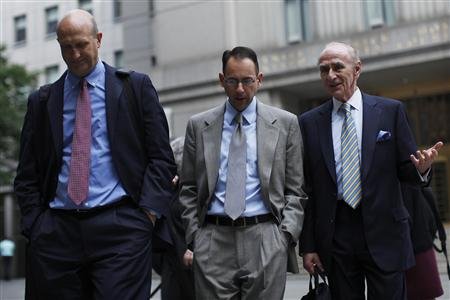
Former UBS AG banker Peter Ghavami leaves the Manhattan Federal Court in New York July 24, 2013 REUTERS Eduardo Munoz
Orr has recognized a 2005-06 predatory $1.5 billion pension obligation certificate loan to the city from the global Swiss bank UBS AG as a chief factor in the debt crisis. On top of numerous other global charges and convictions against UBS AG related to fraud and interest-rate rigging, three former UBS executives were sentenced to prison July 24 in a New York Court “for deceiving U.S. municipalities by rigging bids to invest municipal bond proceeds,” according to Reuters.
U.S. District Court Judge Harold Baer of New York on July 25 blamed another Detroit creditor, Morgan Stanley, for the devastation of Detroit’s neighborhoods in a lawsuit brought on behalf of African-American homeowners,, according to Reuters’ blog author Allison Frankel.
“Judge Baer . . . . rejected all of the bank’s arguments for dismissing the homeowners’ Fair Housing Act claims, giving a stamp of judicial approval to the plaintiffs’ theory that ‘by creating the conditions under which New Century originated toxic loans, Morgan Stanley caused African-American borrowers to fall prey to those loans at a disproportionate rate, or put another way, to make this homeowner nightmare come true,'” Frankel wrote.
“In fact, Baer tied Morgan Stanley – which he described as “this alleged icon of the free enterprise system” – to Detroit’s economic downfall. Citing the complaint’s argument that New Century mortgages to African-Americans that were subsequently purchased by Morgan Stanley suffered unusually high foreclosure rates, Baer said that the city’s bankruptcy filing ‘only emphasizes the broader consequences of predatory lending and the foreclosures that inevitably result.’”
WILL ORDER STAY CHALLENGE TO CONSTITUTIONALITY OF PA 436?
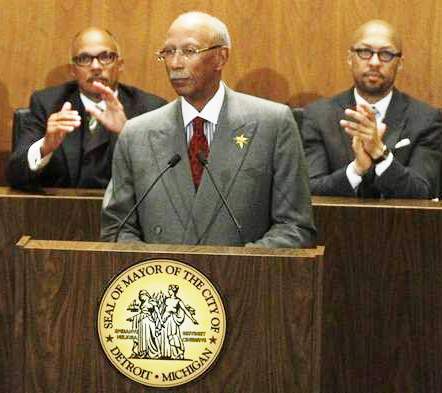
Former Council member Gary Brown, now Chief Compliance Officer under Kevyn Orr, applauds Detroit Mayor Dave Bing. At right is former Council Pres. Charles Pugh, who has disappeared after an alleged sex scandal.
Rhodes’ order stayed all current and future proceedings, financial and otherwise, against the city, and its officers and employees, including Mayor Dave Bing and heads of the Finance and Budget Departments, and Chief Compliance Officer Gary Brown. As part of a stay extension, it barred legal proceedings against Michigan Gov. Rick Snyder, State Treasurer Andy Dillon, and the state’s Emergency Loan Board, related in any way to the bankruptcy case.
Judge Rhodes specifically recognized Orr as a city officer, although he was appointed by Snyder.
The stay permanently quashed three retirees’ state lawsuits which contended that Snyder has no authority under the State Constitution to approve a city bankruptcy filing without exempting pension benefits from consideration.
Judge Rhodes said he would “tweak” the order proposed by Jones Day with regard to various matters, but his order only adds, “This order is entered without prejudice to the right of any creditor to file a motion for relief from the stay imposed by this order using the procedures of and under the standards of 11 U.S.C. § 362(d)-(g).”
It is unclear whether Rhodes’ order will stay proceedings in other federal courts, including two lawsuits, Phillips et al v. Snyder et al, and that claim Michigan’s Public Act 436, under which Orr operates, is unconstitutional. A hearing on Phillips et al is set for September 13 before U.S District Court Judge Graham Steeh’s court. His clerk said they have had no order from Rhodes staying the action as of yet.
Attorney Herbert Sanders, one of the attorneys in Phillips v. Snyder, told Rhodes, “There has already been a motion for summary judgment, and arguments have been scheduled. It appears that the city seeking an extension of the stay regarding finances, but pursuant to oral litigation they are seeking relief concerning any litigation that might interfere with city’s rights as a Chapter 9 debtor. Our case should not be included as part of the stay order. It is imperative the issue in our case should be determined before bankruptcy proceedings.”
FEDERAL LAWSUITS V. POLICE, CONSENT DECREE AFFECTED?
Nathaniel Brent, a pro se federal litigant, questioned during the hearing whether Rhodes’ order will stay federal lawsuits against Detroit police officers accused of violating federal constitutional protections of citizens.
Brent’s five children were seized by Detroit police without judicial review. They were working with Child Protective Services worker Mia Wenk, who initiated the similar seizure of Maryanne Godboldo’s daughter in a case that has become a world-wide cause celebré.
Brent regained custody of his children later after filing pro se.
“I have a claim against City of Detroit police officers for violation of my Fourth Amendment rights, which has been pending for the last two and one-half years,” Brent said. “Now issues of their liability cannot be litigated, although they should continue to be litigated. My case is not part of the City of Detroit restructuring issues. The city has a risk management fund required to have at least $20 million.”
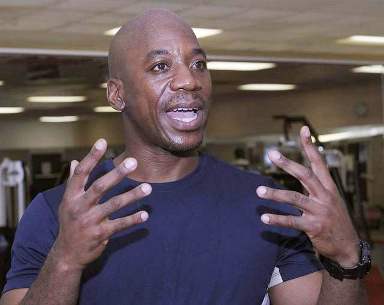
Detroit bankruptcy has stayed payment of $5 million to Dwayne Provience, who spent 10 years in prison as a result of a wrongful conviction.
He also questioned whether the stay should be extended to city employees who are not indemnified for their actions.
Also see following article on bankruptcy stay put on city’s $5 million settlement with a wrongly convicted man, Dwayne Provience, who spent ten years in prison. Provience is a father of three who now works a $9 an hour job. He sued a Detroit Police Sergeant and the city itself for wrongful arrest; a mediator recommended the $5 million settlement, which the city rejected. Case is still in progress. http://www.detroitnews.com/article/20130730/METRO01/307300023?fb_action_ids=10200295010165974&fb_action_types=og.recommends&fb_source=aggregation&fb_aggregation_id=288381481237582
Since the city pays millions a month to a federal monitor under a police consent decree, it is unclear whether it will stay further action on that in U.S. District Judge Julian Abele Cook’s courtroom.
ATTORNEYS FOR PENSION FUNDS, UNIONS OPPOSED ORDER
Representing AFSCME Council 25, the union for the majority of city workers, Attorney Sharon Levine argued against Rhodes’ grant of complete federal jurisdiction, referring to state constitutional protections of pension rights.
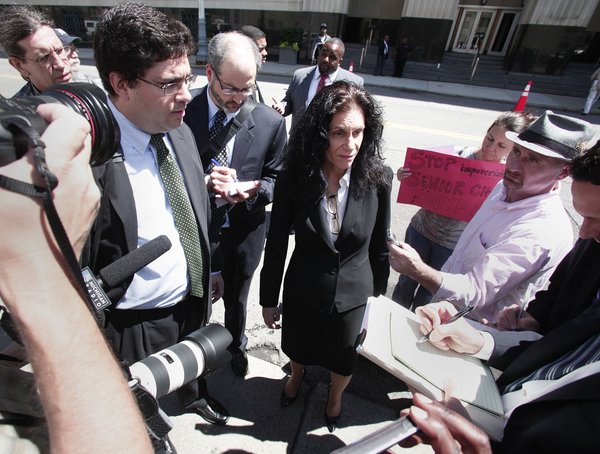
AFSCME Council 24’s attorney Sharon Levine speaks with news media after hearing July 24.
(Photo by Bill Pugliano/Getty
“The state has not properly in fact authorized a Chapter 9 bankruptcy,” Levine said. “If chapter 9 is being used to avoid the state constitution, you are taking away fundamental constitutional rights. The state’s interests are to go after the pensions.”
She argued that state courts, where the retiree lawsuits were pending, are courts of primary jurisdiction under the U.S. constitution, while federal courts are of secondary jurisdiction.
“The people of Detroit have very, very fundamental rights to go to their state courts first,” Levine said. “The Federal Rules of Civil Procedure protect the parties and provide due process. Most of our members are at or below 19,000 a year in their pensions. Unlike the corporations, they have no safety net.”
Attorneys for the city’s pension funds and the United Autoworkers agreed with Levine.
“The Michigan State Constitution provides protection for accrued pension benefits,” Robert Gordon of Clark Hill, representing the pension funds, said. “The Governor cannot unilaterally abrogate the constitution. He is seeking to do indirectly what he can’t do directly.”
William Wertheimer, representing the UAW and plaintiffs in the Flowers case, one of the three retiree lawsuits, added, “Whether the state authorization violates the state constitution is totally a state issue. State courts already have jurisdiction. The Governor’s failure to except pension benefits violates state law.”
Ironically, Attorney Barbara Paddock, representing the Detroit Firefighters Association, the Detroit Police Command Officers Association, The Detroit Police Lieutenants and Sergeants Association, and the Detroit Police Officers Association, concurred with Jones Day’s arguments and even took them a step further to ask the judge to make “an affirmative rule of preliminary injunction,” which he later did.
“We are not conceding the city is eligible to be a debtor,” Paddock said. “We simply believe this court is the proper forum because of the interaction of state and federal law. We want the stay to include members of public safety unions who may be subjected to lawsuits.”
RHODES SAYS MAJOR ISSUES WILL BE ARGUED IN HIS COURT ONLY

Someone painted “Bankruptcy” on wall of building on Grand River near I-75. The letters are in black, green and red, colors of the Black nation.
In his court discussion, Rhodes said he was that day making “no ruling whatsoever as to whether city is eligible to be a debtor under Ch9, . . . whether the state constitution prohibited the Emergency Manager appointment and prohibited the governor from authorizing CH 9 filing without excepting constitutionally protected pension rights . . . whether state orders should be given preclusive effect. . . .whether any order entered by state court after Ch 9 filing violated the stay [and] . . .whether C of D is proposing a feasible plan in light of State Constitution.”
Rhodes added, “Whether it serves the public interest is the most important factor of all. Granting this motion will enhance debtor’s likelihood of reorganization, create efficiency, expedite, reduce city’s costs as well as those of other parties. Court finds it is in the public interest.”
He asserted, “All issues are fully preserved, when and if raised in an appropriate way. The Court will rule on them at that time. We will address procedures in a status conference Aug. 2.”
It is not clear how Rhodes will rule on these matters. He has only presided over one other Chapter 9 case, which a press representative said he thought involved a utility. Rhodes was appointed to the court in 1986 while Ronald Reagan was president.
A Michigan Lawyers Weekley blog reported in 2007, “On a dour note, Rhodes said Chapter 7 debtors need to be more forthcoming about disclosing administered assets. Thirty-seven percent are not “fessing up” to all that they have.
Rhodes said proposed amendments to the court’s local rules, if adopted, will give trustees and the U.S. Attorney’s Office more muscle power to enforce asset disclosure rules.
“'[O]ne of our new proposed local rules would require the trustee to file a report whenever the trustee discovers an undisclosed asset after the debtor testifies at the meeting of creditors that the schedules are accurate. Another … would require the debtor to provide additional documents at the meeting of creditors,’ Rhodes explained.”
Chapter 7 is primarily used by small debtors, not corporations.
BANKRUPTCY WILL NOT IMPROVE CITY SERVICES
Cecily McClellan, a retired city worker who is Vice-President of the Association of Professional and Technical Employees (APTE) said, “It appears to me that Rhodes is being taken in regarding arguments on the public good. Local propaganda about deficiencies in street lighting, quality of life, police protection, does not recognize that much of this was manufactured in order to reach this point. For example, DTE has a $154 million contract to provide energy for the city instead of using the Public Lighting Department. The new Public Lighting Authority wants to issue bonds backed by city for $160 million, in a move orchestrated by DTE.”
McClellan earlier fought the city’s de-commissioning and privatization of three predominantly federally-funded departments as part of the PA4 consent decree. They were Health and Wellness Promotion, Human Services, and Workforce Development. Along with workers in Public Lighting, who are being laid off to make way for the Authority, most of the city workers in those departments lost their jobs, further diminishing Detroit’s tax base, and services to city residents were thrown into chaos or eliminated.
Orr has said he is using the consent agreement as a blueprint for his future plans for Detroit, which he published earlier. His proposal to creditors, which he says will be the basis for the city’s plan of adjustment in bankruptcy, also follows those earlier pacts.
They include the regionalization of Detroit’s Water and Sewerage Department and the lay-off of 81 percent of its workforce under a contract with Toronto-based EMA, which union officials have said will lead to higher rates for Detroit residents.
A state Belle Isle long-term “lease” with no lease payments is also on the agenda, with the attendant elimination of city jobs and current contractors, and the takeover of federal funds which continue to flow to the city to improve the Island, as well as revenues from events and permits.
The Detroit Free Press published a front page interview with Orr July 28, with a banner headline declaring, “Detroit bankruptcy upside: City services will improve.”
It played on residents’ fear of crime. Orr said he plans to provide more police cars, tasers, and even on-body cameras for cops to fight what he portrayed as Detroit’s primary problem: small-scale criminals on the streets.
“The Taser issue illustrates one of the complications Orr’s team faces in improving police service,” said Freep writer Matt Helms in the article. “The city has been under federal oversight for a decade, and the U.S. Justice Department must approve any changes in the Police Department’s policies on use of force. Tasers, which use electricity to temporarily disable suspects, must win federal approval, something top aides to Orr say they believe will be granted because the devices help reduce shootings by officers.”
The city pays millions a month to the federal overseer of the consent decree. Under the stay, those payments should be halted for the time being.
There was a huge outcry during the last decade against the use of tasers in Detroit, which have been shown nationally to cause hundreds of deaths. Opponents said they have their origins in the 19th Century Afrikaaner concept that people of African descent are sub-human, with extraordinary animal strength that must be subdued by extraordinary measures. The website “Electronic Village” reported two days ago that there have been 541 taser deaths in the U.S. since 2001.
Helms said funding for police improvements will come from $11 million annually which he claimed was released by Judge Rhodes stay. Orr recently sued city creditor Syncora, Inc., which insures U.S. Bank NA’s holding of the city’s casino tax revenues pursuant to its 2009 default on the UBS $1.5 billion pension obligation certificates loan. UBS and US Bank agreed to release the funds, but Syncora balked.
Rhodes told representatives of Syncora in court July 24 that their claims will be discussed in a status conference Aug. 2, so those funds are actually still pending for an indefinite period.
The article said further that plans are being laid to hire ANOTHER private contractor to run D-DOT, in the wake of the disastrous performance of Envisurage/Transpro, which led to drastically impaired bus service. Under the new Regional Transit Authority authorized by the state legislature, Detroit has already lost $7.8 million a year in federal funds for D-DOT, which are its primary support. Plans are being laid to subsume D-DOT and SMART into that authority.
STATE AG SCHUETTE TO INTERVENE FOR PENSION RIGHTS
State Attorney General Bill Schuette announced in a release July 25 that he would intervene in the bankruptcy case to protect public pension funds under the state constitution.
Schuette said the constitution makes it “crystal clear in stating that pension obligations may not be ‘diminished or impaired,’” and said Michigan cannot afford to have the standard of living for its people including its retirees further compromised.
He cited the same constitutional provisions Wayne County Circuit Court Judge Rosemarie Aquilina used to bar Snyder from approving Detroit’s bankrujptfy filing in the three state lawsuits.
Schuette, however, opposed her rulings. He previously called for the Michigan Supreme Court to immediately rule on the constitutionality of PA 436, and earlier in his tenure apposed affirmative action in U.S. Supreme Court proceedings, as well as relief from life without parole for juvenile offenders.
However, Schuette may be making note of provisions in PA 436 itself that actually require the governor and the EM to abide by state constitutional protections of pensions.
A brief filed by the city’s pension funds in their state lawsuit says, “It is clear that Michigan’s legislators never intended that the governor or an emergency financial manager take action in violation of Art IX Sec. 24 [protecting pension benefits]. Indeed MCL 141.1552(m)(ii) [in PA 436] expressly provides that “[t]he emergency manager shall fully comply with . . . . section 24 of article IX of the state constitution of 1963. And MCL 38.1683 provides that “[t]he right of a member or retirant of a retirement system to a retirement benefit shall not be subject to execution, garnishment, attachment, the operation of bankruptcy or insolvency laws, or other process of law and shall be unassignable.”
Video below is by Tommy Walker, creator of “Detroit Vs. Everybody” t-shirts worn by firefighters and others July 24. Information about his enterprise is at http://voiceofdetroit.net/2012/09/14/detroit-vs-everybody/’
TO CONTACT RETIREES’ COMMITTEE THAT HELD PROTEST AT CAYMC JULY 26, CALL 313-680-5508 OR GO TO THEIR WEBSITE AT WWW.MORATORIUM-MI.ORG . They hold meetings every Monday at 7 p.m. at 5920 Second Ave. Detroit, MI 48202, near Wayne State University.

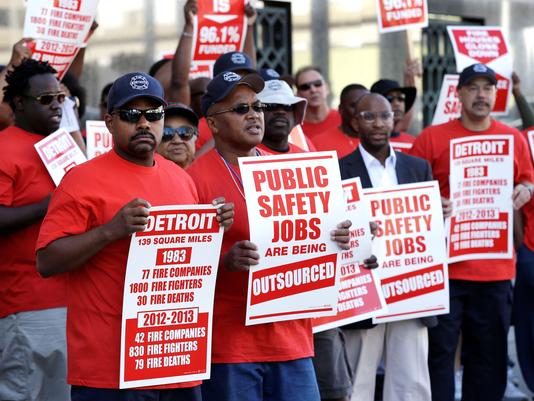

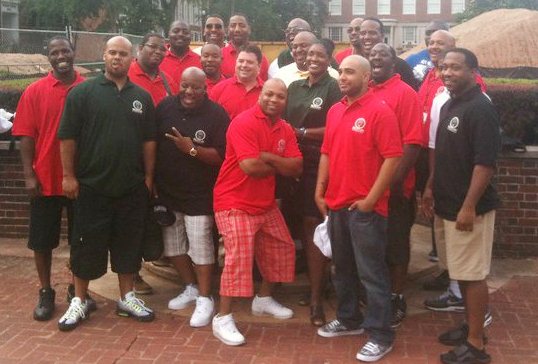
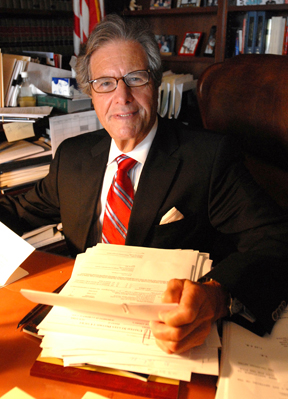
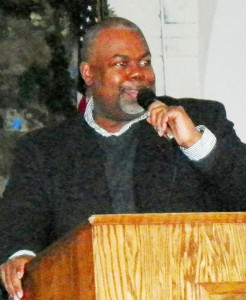




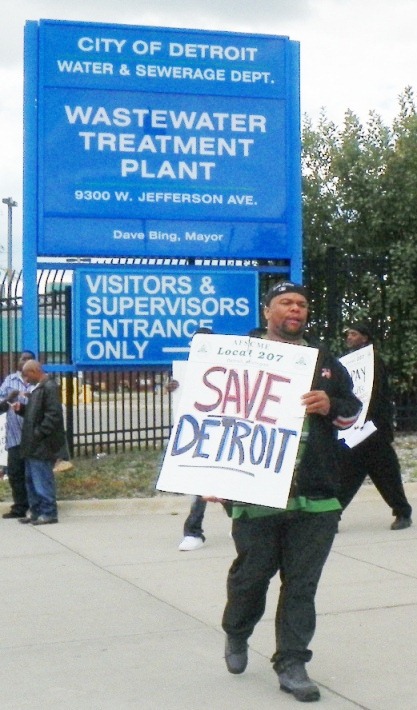







Your site has enumerated many facts and printed many comments by Detroit residents about the problems and failures of the DDOT. I think it would be illuminating for your readers to print the article in the Wall Street Journal, July 30, 2013, by Bill Nojay who was the previous CEO of the DDOT. This article illustrates just some of the dysfunctional facets of Detroit Government. Until financial accountability, and system operational changes occur, Detroit will continue on its path of failure to supply the basic municipal services that its citizens deserve.
Nojay was NOT the CEO of D-DOT–he was the deputy director. He was also a right-wing, racist radio talk show host in New York who was busy campaigning for office there when he was supposed to be here doing his job. Exposes of him by this paper, the Detroit News, and others finally forced him out. While here, he aided in the drastic deterioration of Detroit’s bus service.
Pingback: wchildblog | WAR on the PEOPLE: RETIREES, WORKERS, RESIDENTS V. WALL STREET IN DETROIT BANKRUPTCY; JUDGE THROWS OUT STATE CLAIMS
Thanks for sharing “Voice of Detroit” you are appreciated Diane! Ihekerema Goree’